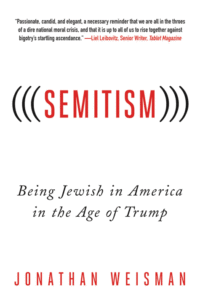Reviewed by NEAL GENDLER
Jonathan Weisman discovered America’s new anti-Semitism when he received a tweet with his name inside three sets of parentheses.
Asking the sender for an explanation, he received an insulting reply calling the parentheses “a dog whistle … belling the cat for my fellow goyim,” or as another anti-Semite put it: “closed captioning for the Jew-blind,” a way Jew-haters identify their targets.

Weisman, deputy Washington editor of The New York Times, had become a target, a shock to someone “largely disconnected from Jewish life and faith.”
Soon, his Twitter account, e-mail and voice mail flooded with hate messages like those sent to other Jews — especially journalists — in the crosshairs of anti-Semites exploiting social media to try to make their victims’ lives miserable.
In (((Semitism))), Weisman exposes the growing strength and confidence of today’s Jew-haters, thriving amid the movement of “white nationalism” and a surging anti-Semitic internet underground. His “Unheard Thunder” chapter outlines an on-line hate industry so multifaceted that it’s difficult for non-initiates even to follow, but its viciousness is stomach-turning — likely the desired effect.
Weisman seeks to illuminate the resurgence of Jew-hatred, questions whether to ignore or combat it, and says that a diminution in Jewish belief has increased our vulnerability.
“The American Jewish obsession with Israel” has taken our eyes off our country’s politics, “the growing gulf between rich and poor, and the rising tide of nationalism,” and our own grounding in faith, he says.
Weisman says: According to Andrew Anglin, founder of the Daily Stormer website, white nationalism’s “core concept” is that “whites are undergoing an extermination” via immigration, and “the Jews are at the center of this agenda.”
White nationalism grew “with little notice beyond the Southern Poverty Law Center, the Anti-Defamation League and a few other organizations and academics that specialize in hate groups,” Weisman says. “Jews seemed oblivious.”
Acknowledging that left-wing anti-Israel attitudes often mask anti-Semitism, Weisman’s focus is on the “alt right” that he says took its cues from the Trump campaign.
“In 2016, the ultimate dumb vessel stepped into the cauldron and carted the alt-right’s stew of hatred into the mainstream,” Weisman says joltingly. “Donald J. Trump no doubt had no better idea of what was happening on the fringe right than the Jewish community did.” But “he embraced the cause of white nationalism. …
“Whether he knew it or not, Donald Trump ran the most anti-Semitic presidential campaign in modern American history,” Weisman says, mentioning Trump statements that the alt-right could take as encouragement and times that he or his campaign used anti-Semitic terms such as “international banks” and anti-Semitic images.
“The Trump campaign and its supporters may have wanted nothing to do with the anti-Semitic shock troops that Trump was attracting, but anti-Semites wanted everything to do with Trump,” Weisman says.
He says the alt-right backs Israel “as a destination for the Jews they long to evict from the White Homeland.” Weisman says neo-Nazis claim not to be racists, but “now that Jews have their own country, they should go there and leave the United States to the white people who valiantly claimed it long before it was cluttered by the mongrel races.”
But “burrow down a millimeter beneath this argument, and it is very easy to see that unlike European anti-Semites, their American brethren very much do hate Jews per se and do not try very hard to hide it,” Weisman says An alt-right theme is that a “fifth column of duplicitous Jews is constantly urging the United States to go to war on Israel’s behalf.”
So what to do?
Weisman’s answers are to “use legal channels to dismantle or bankrupt hate groups that attack,” and to build coalitions to publicly oppose hatred and abuse. Minnesota has had one for decades: The Joint Religious Legislative Coalition, including Christians, Jews and Muslims. It “mobilizes religious communities to influence public policy for social justice.”
Standing up to the haters gives them publicity they crave, but Weisman comes down on the side of doing so, quoting Rabbi Daniel Zemel of Temple Micah in Washington, D.C., that “a central Jewish lesson is to oppose evil in all forms.”
***
Neal Gendler is a Minneapolis writer and editor.
(American Jewish World, 4.6.18)




















